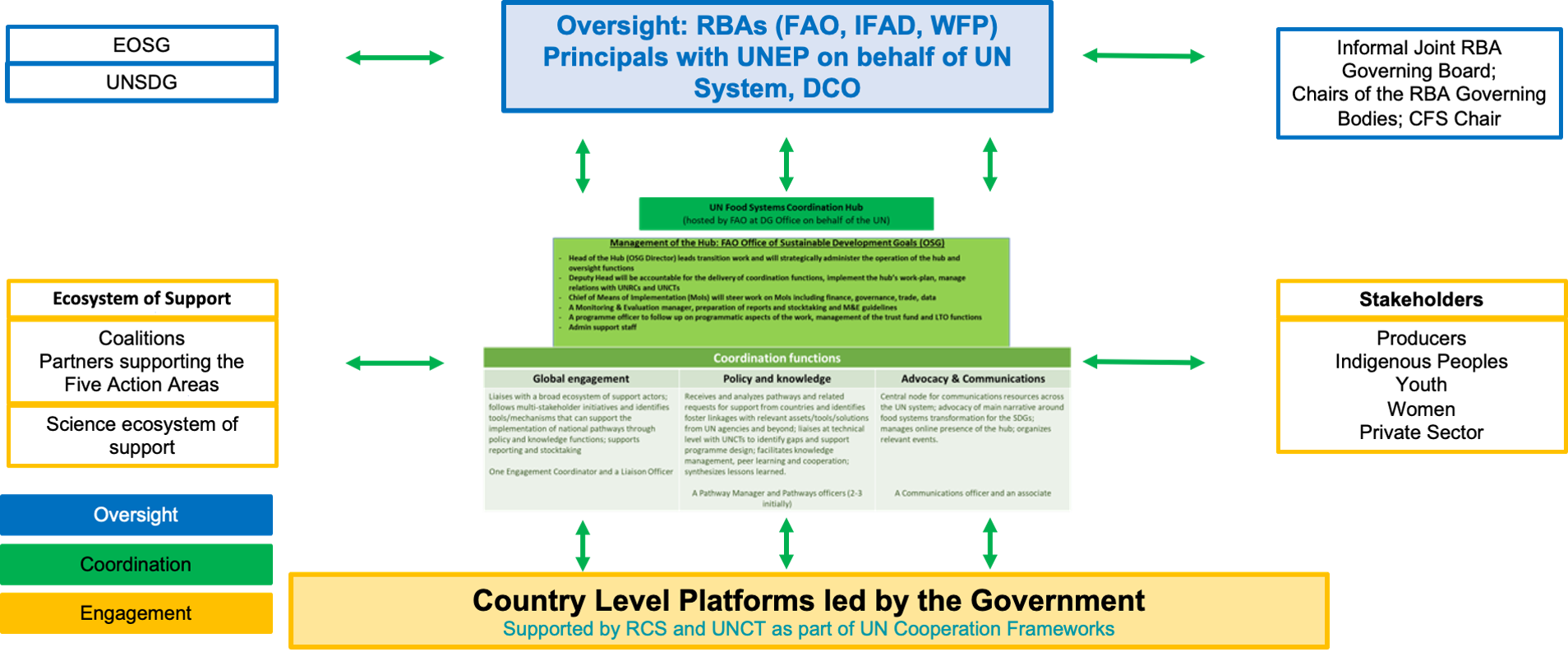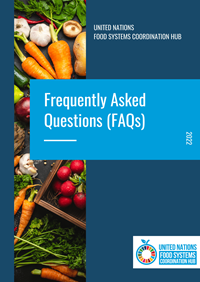Frequently Asked Questions
The Hub’s role is to support countries to further develop and/or implement their national food systems transformation pathways, relevant dialogues and other processes, through the coordination of technical and policy support as requested by countries. The Hub works to do the following:
- Connect the broader ecosystem of actors, including coalitions and other initiatives, as well as the science ecosystem.
- Promote alignment and integration of actors’ efforts with country demand.
- Elevate priority topics in the food systems transformation agenda for strategic thought leadership of UN Agencies, leading actors, and other supporting parties.
The Hub focuses on leveraging the broad range of assets of the UN system – particularly within the context of the repositioning of the UN development system – and existing SDG reporting structures to demonstrate progress. The Hub serves as a coordinator and connector among diverse constituencies to support national progress on the SDGs and is responsive to country priorities.
While the Hub facilitates the identification of support services and manages a system to coordinate support to countries, the actual implementation of these services is done by the UN agencies supporting the Hub and other actors. To this end, the Hub prioritizes six key functions:
- Facilitate implementation of national pathways.
- Strengthen strategic thought leadership, in support of countries.
- Engage the ecosystem of support across the UN system and more widely.
- Leverage means of implementation.
- Communicate and advocate for a food systems approach.
- Prepare for the 2023 Stocktaking Moment.
Following the 2021 Food Systems Summit, the Secretary-General committed the UN system to jointly lead a Coordination Hub that collaborates with and draws upon wider UN system capacities to support follow-up to the Food Systems Summit.
The UN Deputy Secretary-General and the Principals of FAO, IFAD, WFP, UNEP and the DCO agreed to establish the Hub and an information note was issued to inform Member States and key partners on the arrangements.
The following AFPs have committed to provide human or/and financial resources to support initial operations of the Hub:

The UN Food Systems Coordination Hub is resourced by the AFPs listed above through the provision of staff and financial resources. The structure of the Hub, within the overall architecture of the FSS follow up, is presented below:

The Hub supports the development and implementation of food systems transformation national pathways, which are country-owned and demand-driven.
Leveraging UN system capacities at country, regional and global levels, the Hub provides support to national food systems dialogues and national pathways through the coordination of technical and policy support, upon request by countries. In both the short- and medium-terms, the Hub works to analyse requests and match available solutions to country needs. Wherever relevant and applicable, these efforts would inform and align with the Common Country Analyses (CCAs) and the UN Sustainable Development Cooperation Frameworks (UNSCDFs).
The Hub also supports the network of National Convenors to continue sharing experiences and knowledge in order to further enhance collaboration, foster cross-sectoral action and nurture global solidarity. Independent dialogues are also encouraged as a means for complementary engagement of a range of communities and constituencies, to inform national pathway priorities and to accelerate action.
More information on country support can be found in the Hub's Biennial Workplan.
One of the Hub’s key functions is to increase awareness and drive collective mobilization around the role of food systems transformation to deliver the SDGs. Governments will be routinely informed about progress through:
- The Oversight Group;
- Updates via the Informal Joint Meeting of RBA Governing Bodies;
- Consultations with the Chairs of the RBAs Governing bodies;
- Reporting using existing intergovernmental structures and platforms of the UN Agencies, Funds and Programmes supporting the Hub;
- Leveraging opportunities to communicate on the work of the Hub in relevant sessions and events organized by the ecosystem of support members;
- A dedicated Hub website.
The Hub connects coalitions by keeping a publicly available repository of up-to-date information on each of the coalitions. The Hub serves as a client-oriented connector and credible source of information for the Ecosystem of Support and works to help identify overlaps, complementarities and opportunities for joint action.
The Hub also connects coalitions with the countries for accelerating food systems transformative actions. Coalitions, commitments, and all other initiatives emerging from the FSS, as well as those that will continue to emerge, are invited to regularly report on their progress and to participate in a network of mutual learning and support.
The SENA Group works to ensure that the national pathways and other national, regional, and global platforms (e.g., dialogues, coalitions, initiatives, etc.) are informed by, and consider the perspectives and views of, these constituencies to enhance effectiveness, transparency, and inclusiveness. Members of the SENA Group are expected to activate and harness the power of their existing networks and communities, promoting and building additional networks of support where needed within and across constituencies, generating action in support of and aligned with countries’ food systems transformations.
If you are a National Convenor and you would like to request support from the Hub, the first level of contact would be the UN Resident Coordinator in your country. You can always copy the [email protected] in your communication with the UNRCs.
If you are part of the Ecosystem of Support and you would like to contact the Hub in this initial phase of the Hub’s operation, please address your inquiries to [email protected].

Focus on
HUB FREQUENTLY ASKED QUESTIONS
Access the PDF version of the Hub's Frequently Asked Questions (FAQs).
